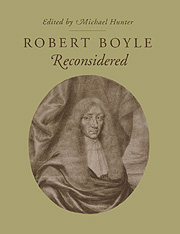Book contents
- Frontmatter
- Contents
- List of contributors
- List of abbreviations
- Preface
- 1 Introduction
- 2 Virtue, providence and political neutralism: Boyle and Interregnum politics
- 3 Science writing and writing science: Boyle and rhetorical theory
- 4 Learning from experience: Boyle's construction of an experimental philosophy
- 5 Carneades and the chemists: a study of The Sceptical Chymist and its impact on seventeenth-century chemistry
- 6 Boyle's alchemical pursuits
- 7 Boyle's debt to corpuscular alchemy
- 8 Boyle and cosmical qualities
- 9 The theological context of Boyle's Things above Reason
- 10 ‘Parcere nominibus’: Boyle, Hooke and the rhetorical interpretation of Descartes
- 11 Teleological reasoning in Boyle's Disquisition about Final Causes
- 12 Locke and Boyle on miracles and God's existence
- Bibliography of writings on Boyle published since 1940
- Index
10 - ‘Parcere nominibus’: Boyle, Hooke and the rhetorical interpretation of Descartes
Published online by Cambridge University Press: 03 December 2009
- Frontmatter
- Contents
- List of contributors
- List of abbreviations
- Preface
- 1 Introduction
- 2 Virtue, providence and political neutralism: Boyle and Interregnum politics
- 3 Science writing and writing science: Boyle and rhetorical theory
- 4 Learning from experience: Boyle's construction of an experimental philosophy
- 5 Carneades and the chemists: a study of The Sceptical Chymist and its impact on seventeenth-century chemistry
- 6 Boyle's alchemical pursuits
- 7 Boyle's debt to corpuscular alchemy
- 8 Boyle and cosmical qualities
- 9 The theological context of Boyle's Things above Reason
- 10 ‘Parcere nominibus’: Boyle, Hooke and the rhetorical interpretation of Descartes
- 11 Teleological reasoning in Boyle's Disquisition about Final Causes
- 12 Locke and Boyle on miracles and God's existence
- Bibliography of writings on Boyle published since 1940
- Index
Summary
It was not uncommon for Robert Boyle, who feared plagiarists almost as much as atheists, to entrust his precious drafts to Henry Oldenburg, who was certainly neither, and who could if Boyle desired publish them properly in the Philosophical Transactions. The draft for one of his greatest works, A Disquisition about the Final Causes of Natural Things, was no exception. Dedicated to Oldenburg, who had ‘pressed me for it’, the body of the treatise had been written ‘many years’ before its actual publication in 1688, according to Boyle's own account in the preface. Oldenburg certainly knew of its existence, and probably saw a draft early in 1677, but upon his death later that year the unpublished draft was ‘thrown by’, not to see the light of day for more than a decade. By that time Boyle had dredged up for publication another draft he had thrown by — that of A Free Inquiry into the Vulgarly Received Notion of Nature, originally written in 1666, but not printed until 1686.
The central problem Boyle confronted in these works is one that dogged him throughout his scholarly life: how to reconcile the mechanical philosophy with Christian theology. Boyle chose the high road to harmony, arguing that the new science was not only acceptable to Christians, but actually more amenable to Christianity than less mechanistic alternatives.
- Type
- Chapter
- Information
- Robert Boyle Reconsidered , pp. 157 - 176Publisher: Cambridge University PressPrint publication year: 1994
- 5
- Cited by



